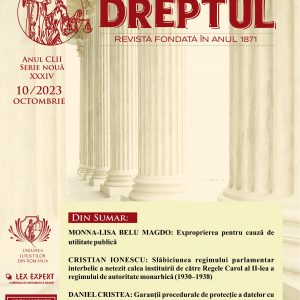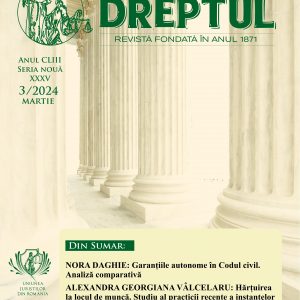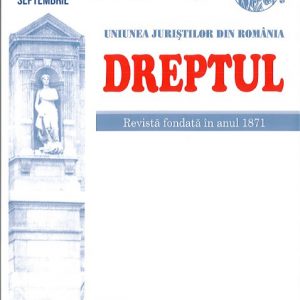-
 The official proclamation of the climate emergency (at an international, European, and national level) has stimulated the concerns and efforts to regulate and adopt public policies aiming for mitigation of, and adaptation to climate change. Initiated in the name of the principle of precaution – scientific uncertainty regarding the anthropic causes do not justify the inconsideration of the phenomenon, but they impose taking progressive and proportional measures – 30 years ago, the process of development of climate law has already known three successive and progressive stages, configured around three major international acts. The Framework Convention on climate change (1992) has generated a general normativity, as a guideline and non-binding; the additional Kyoto Protocol (1997), with a superior legal force, provided precise targets and determinate periods of time to reach them; finally, the Paris Agreement (2015) has marked the phase of voluntary commitments and of adequate instruments, varied in their means of enforcing. Characterized by a dependency and a major interconnection with scientific data, climate law is inspired by a series of fundamental concepts (general interest of humanity, environmental transition, the rights of future generations, global approach), and it is dominated by a series of general principles (precaution, common but differentiated responsibility, the right to a stable climate), affirming itself as a law of the present day, but especially of the future. Assuming the Green Deal as a new strategy for growth of the EU (2019), of the law for climate (2020) and the return of the USA to the Paris Agreement (2021) re-launch the multi-lateral framework for negotiation and international regulation in this field, opening ample perspective for affirmation of the new legal regime and the innovative scientific field.
The official proclamation of the climate emergency (at an international, European, and national level) has stimulated the concerns and efforts to regulate and adopt public policies aiming for mitigation of, and adaptation to climate change. Initiated in the name of the principle of precaution – scientific uncertainty regarding the anthropic causes do not justify the inconsideration of the phenomenon, but they impose taking progressive and proportional measures – 30 years ago, the process of development of climate law has already known three successive and progressive stages, configured around three major international acts. The Framework Convention on climate change (1992) has generated a general normativity, as a guideline and non-binding; the additional Kyoto Protocol (1997), with a superior legal force, provided precise targets and determinate periods of time to reach them; finally, the Paris Agreement (2015) has marked the phase of voluntary commitments and of adequate instruments, varied in their means of enforcing. Characterized by a dependency and a major interconnection with scientific data, climate law is inspired by a series of fundamental concepts (general interest of humanity, environmental transition, the rights of future generations, global approach), and it is dominated by a series of general principles (precaution, common but differentiated responsibility, the right to a stable climate), affirming itself as a law of the present day, but especially of the future. Assuming the Green Deal as a new strategy for growth of the EU (2019), of the law for climate (2020) and the return of the USA to the Paris Agreement (2021) re-launch the multi-lateral framework for negotiation and international regulation in this field, opening ample perspective for affirmation of the new legal regime and the innovative scientific field. -
 In this article we have looked into the content of the concept of case law of the European Court of Human Rights, determining in the national criminal process the legal nature and the presentation of the reasons for its application. We have also addressed the premises of using case law as a source of law within the criminal trial, highlighting the particularities and advantages of the applicability of the case law of the E.C.H.R. within criminal trial. Through the research carried out, it has been conducted a complex investigation of the theoretical-legislative aspects regarding the applicability of the case law of the E.C.H.R. within the criminal trial as a source of law. The paper formulates conclusions and recommendations that can represent a scientific basis for possible legislative amendments. In the present study, we reiterated the most current theoretical-applicative issues, as well as the methodological aspects regarding the applicability of the case law of the E.C.H.R. in the criminal trial, being revealed some concepts of major importance for the national doctrine and practice.
In this article we have looked into the content of the concept of case law of the European Court of Human Rights, determining in the national criminal process the legal nature and the presentation of the reasons for its application. We have also addressed the premises of using case law as a source of law within the criminal trial, highlighting the particularities and advantages of the applicability of the case law of the E.C.H.R. within criminal trial. Through the research carried out, it has been conducted a complex investigation of the theoretical-legislative aspects regarding the applicability of the case law of the E.C.H.R. within the criminal trial as a source of law. The paper formulates conclusions and recommendations that can represent a scientific basis for possible legislative amendments. In the present study, we reiterated the most current theoretical-applicative issues, as well as the methodological aspects regarding the applicability of the case law of the E.C.H.R. in the criminal trial, being revealed some concepts of major importance for the national doctrine and practice. -

-
 One of the major problems with direct implications in the effective implementation of judicial cooperation in criminal matters within the European Union is related to the need for coherent legal norms regarding the establishment of the territorial jurisdiction in the event of positive or negative conflicts of jurisdiction between the competent legal bodies of two or more Member States. In the study, the author examined the provisions of the European regulatory document framework which set out a series of legal norms on preventing and settling conflicts of jurisdiction between the Member States, making some critical remarks designed to help the improvement of the legal system. This paper is aimed at all those interested in this field and can be useful to academics and to practitioners as well. The innovations consist of the general examination of the European regulatory document provisions, of the Romanian special law, with some critical comments, and of proposals for rewording legal rules, aiming at improving the complex system of judicial cooperation in criminal matters between the Member States.
One of the major problems with direct implications in the effective implementation of judicial cooperation in criminal matters within the European Union is related to the need for coherent legal norms regarding the establishment of the territorial jurisdiction in the event of positive or negative conflicts of jurisdiction between the competent legal bodies of two or more Member States. In the study, the author examined the provisions of the European regulatory document framework which set out a series of legal norms on preventing and settling conflicts of jurisdiction between the Member States, making some critical remarks designed to help the improvement of the legal system. This paper is aimed at all those interested in this field and can be useful to academics and to practitioners as well. The innovations consist of the general examination of the European regulatory document provisions, of the Romanian special law, with some critical comments, and of proposals for rewording legal rules, aiming at improving the complex system of judicial cooperation in criminal matters between the Member States. -
 The article analyzes the changes brought in the matter of approval of the application for enforcement. In the Civil Procedure Code of 1865, the enforcement court had jurisdiction over the approval of the application for enforcement. By the Law No 459/2006, this jurisdiction has been changed and the power to approve the application for enforcement has been recognized to the court executor. By the Decision of the Constitutional Court No 458/2009, this change was declared unconstitutional and it was restored the approval of the application for enforcement by the enforcement court. By the Law No 134/2010, that is the new Civil Procedure Code, it has been preserved the approval of the enforcement by the enforcement court, however, by the Law No 138/2014, it was restored the form declared unconstitutional. Therefore, we have considered as being predictable the admission of the plea of unconstitutionality of the provisions of Article 666 of the Civil Procedure Code, by the Decision of the Constitutional Court No 895/2015. Following the Decision of the Constitutional Court No 895/2015, it has been adopted the Government Emergency Ordinance No 1/2016, which reinstated to the jurisdiction of the enforcement court the approval of the enforcement applications. In our opinion, the legal and correct solution is the approval of the enforcement by the enforcement court.
The article analyzes the changes brought in the matter of approval of the application for enforcement. In the Civil Procedure Code of 1865, the enforcement court had jurisdiction over the approval of the application for enforcement. By the Law No 459/2006, this jurisdiction has been changed and the power to approve the application for enforcement has been recognized to the court executor. By the Decision of the Constitutional Court No 458/2009, this change was declared unconstitutional and it was restored the approval of the application for enforcement by the enforcement court. By the Law No 134/2010, that is the new Civil Procedure Code, it has been preserved the approval of the enforcement by the enforcement court, however, by the Law No 138/2014, it was restored the form declared unconstitutional. Therefore, we have considered as being predictable the admission of the plea of unconstitutionality of the provisions of Article 666 of the Civil Procedure Code, by the Decision of the Constitutional Court No 895/2015. Following the Decision of the Constitutional Court No 895/2015, it has been adopted the Government Emergency Ordinance No 1/2016, which reinstated to the jurisdiction of the enforcement court the approval of the enforcement applications. In our opinion, the legal and correct solution is the approval of the enforcement by the enforcement court. -

-
 Presumptions have been playing an important role in the civil trial, their necessity and utility being recognized both in the doctrine and in the judicial practice. Recently, in order to remove any doubt about the quality of means of evidence of the presumptions, the legislator of the Civil Procedure Code enumerates them among the means of evidence and, at the same time, establishes their legal regime, and the legislator of the Civil Code has extended the scope of the legal presumptions. The reason behind these regulations is based precisely on the necessity to find out the truth also in the cases in which the judge does not have available direct evidence. Certainly, as we have stated on another occasion, the presumptions are indirect means of evidence, as the conclusions drawn imply eo ipso the prior proof of a fact that is neighbouring and related to the unknown fact. As we shall further show, the Romanian legislator has understood to classify the presumptions into legal (established by law) and judicial or simple (left to the enlightments and wisdom of the judge), with the mention that, in this study, we shall refer in particular to the legal presumptions.
Presumptions have been playing an important role in the civil trial, their necessity and utility being recognized both in the doctrine and in the judicial practice. Recently, in order to remove any doubt about the quality of means of evidence of the presumptions, the legislator of the Civil Procedure Code enumerates them among the means of evidence and, at the same time, establishes their legal regime, and the legislator of the Civil Code has extended the scope of the legal presumptions. The reason behind these regulations is based precisely on the necessity to find out the truth also in the cases in which the judge does not have available direct evidence. Certainly, as we have stated on another occasion, the presumptions are indirect means of evidence, as the conclusions drawn imply eo ipso the prior proof of a fact that is neighbouring and related to the unknown fact. As we shall further show, the Romanian legislator has understood to classify the presumptions into legal (established by law) and judicial or simple (left to the enlightments and wisdom of the judge), with the mention that, in this study, we shall refer in particular to the legal presumptions. -
 In this paper the author has proceeded to a brief examination of the European normative act adopted in March 2016, which regulates the presumption of innocence and the right to be present at the trial within the criminal procedures, both rights being circumscribed to the right to a fair trial provided in Article 6 of the European Convention on Human Rights and Fundamental Freedoms. The study also makes a comparative examination which has in view how these rights of the suspect or of the accused are protected in the Romanian law, also expressing some critical opinions as concerns the European normative act. The elements of novelty consist in the examination made, as well as in the comparative analysis and the critical opinions expressed.
In this paper the author has proceeded to a brief examination of the European normative act adopted in March 2016, which regulates the presumption of innocence and the right to be present at the trial within the criminal procedures, both rights being circumscribed to the right to a fair trial provided in Article 6 of the European Convention on Human Rights and Fundamental Freedoms. The study also makes a comparative examination which has in view how these rights of the suspect or of the accused are protected in the Romanian law, also expressing some critical opinions as concerns the European normative act. The elements of novelty consist in the examination made, as well as in the comparative analysis and the critical opinions expressed. -

-
 According to the decision of the supreme court, further to the judge admitting the complaint against the resolution not to initiate criminal investigations and sending the case to the prosecutor, the latter cannot be obliged to initiate the criminal investigation; in his turn, the judge cannot hold the case for settlement, the consequences being very serious in what regards free access to justice.
According to the decision of the supreme court, further to the judge admitting the complaint against the resolution not to initiate criminal investigations and sending the case to the prosecutor, the latter cannot be obliged to initiate the criminal investigation; in his turn, the judge cannot hold the case for settlement, the consequences being very serious in what regards free access to justice. -

-
 It has become recently effective Law no. 40/2011 amending and supplementing Law no. 53/2003 (the current Romanian Labour Code), wideranging regulation bringing the Labor Code of 2003 more than 100 amendments, supplements and repeals forward. Within the two studies’ pack - published independently, though under the same title - the two authors review but 16 of these amendments/supplements/ repeals which require, necessarily, a legal review in order to clarify the meaning and effect of the incidence of some purports, so as to avoid controversy and debate in case law and doctrine, likely to cause difficulties and confusion in the practical implementation of relevant purports. Finally, the authors advance a more general conclusion in terms of Law no. 40/2011.
It has become recently effective Law no. 40/2011 amending and supplementing Law no. 53/2003 (the current Romanian Labour Code), wideranging regulation bringing the Labor Code of 2003 more than 100 amendments, supplements and repeals forward. Within the two studies’ pack - published independently, though under the same title - the two authors review but 16 of these amendments/supplements/ repeals which require, necessarily, a legal review in order to clarify the meaning and effect of the incidence of some purports, so as to avoid controversy and debate in case law and doctrine, likely to cause difficulties and confusion in the practical implementation of relevant purports. Finally, the authors advance a more general conclusion in terms of Law no. 40/2011.
